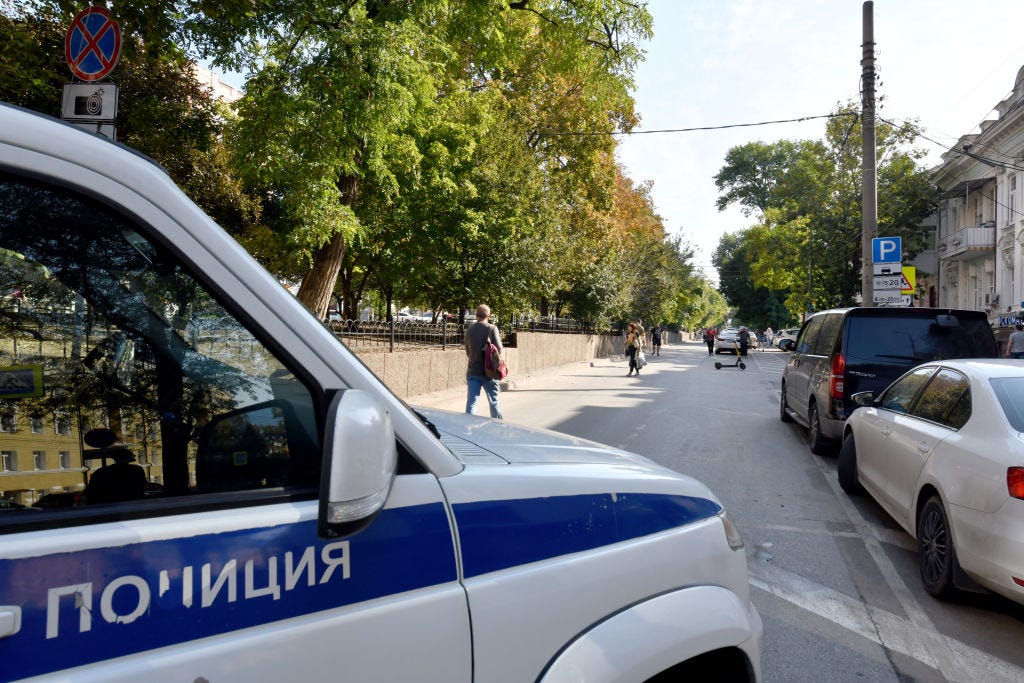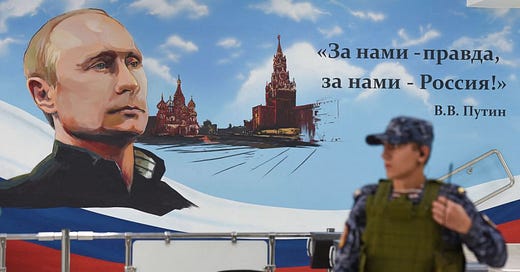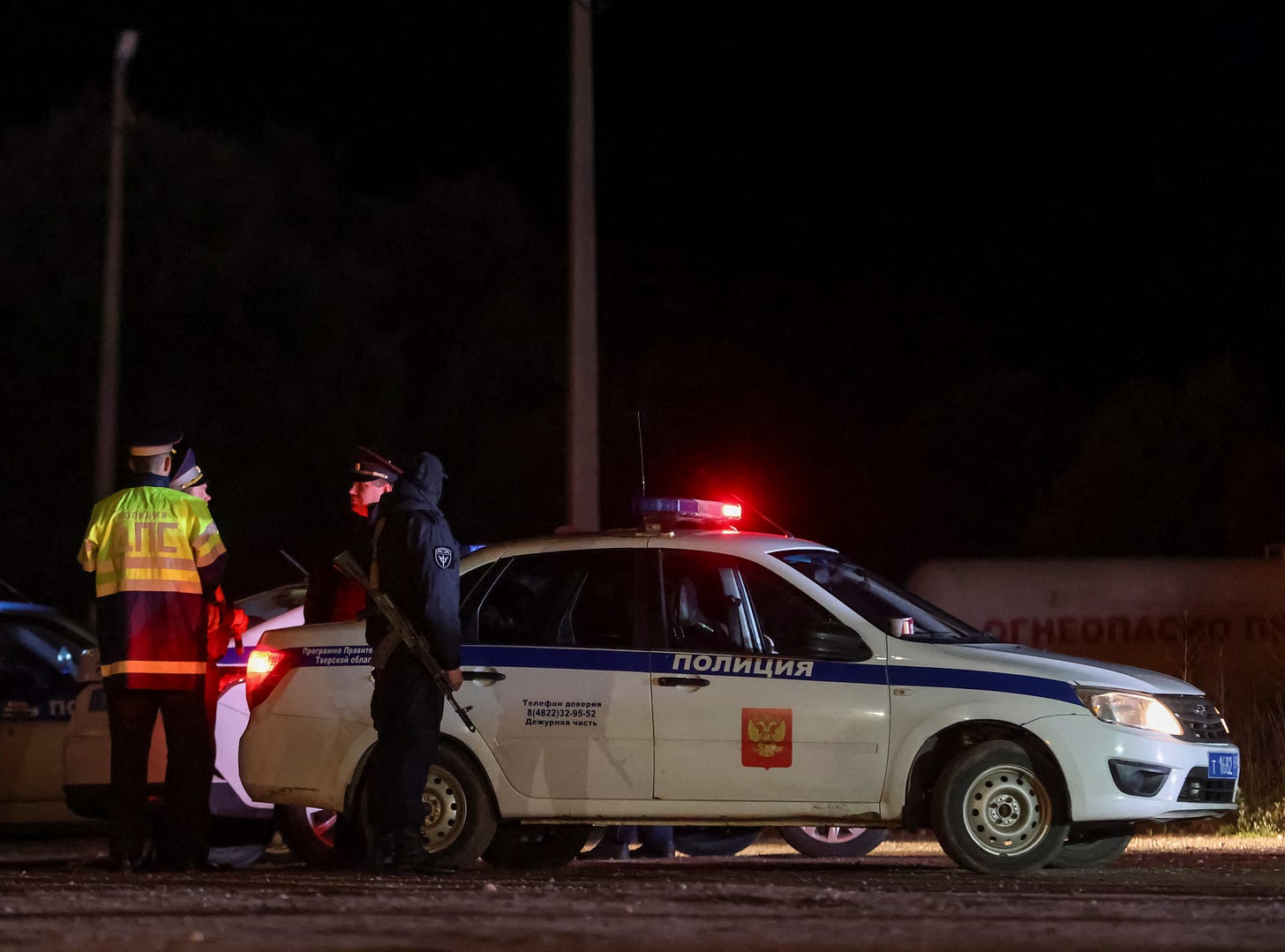Russian police: burnt out, disappointed and confused
Since the start of the war in Ukraine, Russian police officers are abandoning the force in droves to become taxi-drivers, couriers, or cashiers.
In the early hours of January the 14th 2020 in the Siberian city of Kemerovo, Major Mikhail Balashov was engaged in what would become a hopeless search for reinforcements. He urgently needed a police officer to go to an apartment in the Leningradsky district where 23-year old Vera Pekhteleva was being attacked by her ex-boyfriend.
Vera’s neighbours had heard her cries of pain and called the police. The messages were relayed to Major Balashov, who was repeatedly told by the control room that there were no officers or patrol cars in the city available to attend.
In the end Vera was stabbed 56 times, beaten and finally strangled with a wire. It took several hours for her to die.
In July of this year, Major Balashov and four of his fellow officers were found guilty of causing death by negligence, and sentenced to eighteen months in jail, suspended for two years. These relatively lenient sentences were passed as the problem they faced was deemed to involve “the whole force” – the problem of officer shortages.
Failure to answer a call
In August, Vladimir Kolokoltsev the Interior Ministry chief warned of a “critical” shortage of police officers which could affect crime rates. According to Kolokoltsev, the Ministry has lost half of its police officers over the last decade. This decrease in personal has been met directly with an increased in demand for at least another 90,000 extra personnel in the Russian regions, and by 2026 the Ministry will be also need another 42,000 officers to cover the newly occupied territories in Ukraine.
BBC is blocked in Russia. We’ve attached the story in Russian as a pdf file for readers there.
In a special decree this January, Vladimir Putin capped the Interior Ministry’s workforce to 922,000. This means there are close to a million police officers serving a population of approximately 146 million, making the Russian police force one of the largest in the world with just about 630 officers per 100 thousand people.
For comparison the USA employs 242 law-enforcement officers per 100 thousand people, in a population twice the size of Russia’s. And in Britain, a country with a population of 68 million, there are even less, with 227 police officers for every 100 thousand people.
Nevertheless, all of Russian regions complain that there aren’t enough police to go round. In March 2023, the St Petersburg city assembly had to acknowledge that a third of the city’s police were in fact missing, while the rest of the force were burnt out. The year before in 2022, a Yekaterinburg official confessed that locals were struggling to contact the police, as the local department was 125 officers short.
The failure to answer a distress call was almost unheard of, until the news of the murder of Vera Pekhteleva. All the police interviewed by the BBC confirmed this, with a Major from Voronezh adding that officers around the country were now paranoid about missing one such call amongst hundreds of petty disputes between neighbours. One year after Vera’s murder, there were 1000 police vacancies in [large Siberian city of] Kemerovo alone.
A city without law and order
“There’s been a shortage for ages,” says an officer from Ivanovo, in Central Russia. “I started in 2015, and only two people have joined the team in the last eight years...while 15 have left.”
Several BBC interviewees stated that overstretched police forces are now refusing to open cases even after citizens have provided a statement.

“Say an investigator has five witness statements in front of him, he can find time for each report. But say he has 50 reports and is working without colleagues…the time-frame doesn’t change, everyone gets 10 days to examine statements, whether there are five or 50. Obviously, the quality of work deteriorates,” argues a detective from Novosibirsk.
“What happens next? The investigators refuse to open criminal proceedings, on formal grounds. If there’s a string of 10 or so things they have to do – call on neighbours, cross-examine witnesses, visit the crime-scene – they’ll just do one or two, and write down that it "wasn’t possible” to complete the others. Then they refuse to open charges – there will be no investigation.”
Another worrying side-effect of the recruitment crisis is a spike in violence against detainees.
“The calibre of detection is suffering,” admits a Major from Tomsk. “What I’m seeing more and more often…fellow officers getting locked up for beating someone. You know, beating a confession out of them, inflating arrest quotas….we’re seeing this all the time.”
“It’s only going to get worse. There will be falsification of evidence, targeted beatings…there just isn’t going to be time to investigate anything properly. You’ve got a lead and you need to chase it? Much simpler to drag the first suspect back to the station and beat him up, so he takes the blame. That’s it.”
It looks as if this might already be taking place.
Sergei worked at the Interior Ministry for six years, and describes himself as “fanatically” committed to his job. He acknowledges that even officers like him tend to leave the force or end up in jail. The latter was true in his case: whilst on duty he chased a drug dealer, and beat him when he tried to eat all the drugs on his person.
“I was using my own car, I bought my own paper, cartridges, and printer; my own computer, my desk, my chair, my petrol…I laid my own floor tiles [in the office], repaired everything,” he laments.
“Supermarket cashiers get more than us”
In 2011, President Dmitry Medvedev tried to reform the force, and his efforts are remembered fondly to this day. But today, sadly, joining the Russian police is no longer a byword for social mobility.
“Back then, I was getting 50,000 roubles, not bad,” a former officer from Rostov, in South West of Russia, told BBC Russian. “But 50,000 now, after inflation and the new prices? They haven’t adjusted the salary at all.” The officer later quit to become a driver for a Taxi company. His friend (also a police officer) became a courier. Both of them earned twice as much as they had in the police.
“I’ve reached the rank of Major, and they’re paying me 45,000 rubles (a month). And a cop on the beat only earns 20,000. A cashier at Pyaterochka [the Russian supermarket chain] earns more than that, hardly dangerous work. Only an idiot would join the police now.”
According to job site Headhunter.ru, the average police salary in Russia is 40,000 rubles, or just over 407 dollars per month (although slightly higher in Moscow and St Petersburg.) Russia’s average salary in 2023 is 63,000 rubles – or 642 dollars per month. Whereas according to the US Bureau of Labor Statistics American police officers earn 5600 dollars a month (530,000 rubles) a considerably higher wage than the average US salary of 4300 dollars a month. In the UK, police officers receive 2700 pounds a month (3360 dollars or 322,000 rubles) which is roughly the national average salary.
Elsewhere, a Polish police officer who has been in the job for at least three years, can look forward to a salary of 4000 zloty (925 dollars or 90,000 rubles) And in Ukraine, the country Russia is invading, a police officer earns around the same as in Russia, 20,100 hryvnias (544 dollars, or 51,000 rubles).
“Moscow bosses don’t give a damn”
Before the war began and in spite of officer shortages, the Interior Ministry carried out a purge of officers linked to the opposition politician, Alexei Navalny. Many of them were in good standing with their superiors and had served for decades.
These purges swept through multiple regional departments. And according to a BBC source the Moscow FSB compiled a “black-list” based on a hacked Smart Voting database (created by Navalny supporters) full of subscriber email addresses.
Police departments across Russia are now missing 60-80 percent of their staff, says Andrei Koryaev from Nizhny Tagil (in Siberia). He like many of his colleagues was fired after the New Year’s holiday ended in 2022.
The dismissed officers’ unfinished cases are passed on to the police who are left.
“The bosses in Moscow don’t give a damn what happens here on the ground, they send us out to every grandma who phones in to complain about the drunks next door. It’s no use…” says another former officer, fired for subscribing to Navalny’s Smart Voting.
Koryaev is glad he left. “I gave everything I had, 24/7, and it was psychologically heavy work. It means the state doesn’t need people like me. My wife and I want to move to Europe, or Canada.”
“A curtain that looked like the Ukrainian flag”
One of the more surprising causes for resignations is paperwork. When the war broke out, police desks around the country were soon overflowing. Interior Ministry officials from Tomsk, Yekaterinburg and Yaroslavl claim they now spend most of their time investigating and revising “endless charges on the discreditation of the army.”
“People are always looking for an excuse to denounce someone over the ‘special military operation’,” says the former Major from Tomsk. “So there’s always more to do. And whenever something real comes up, there’s nobody to investigate. Everyone’s gone to check on some grandma who saw a curtain that looked like the Ukrainian flag.”
“I see where we’re heading,” he predicts, “There’s already an emphasis on crimes against the state. Going forward, more and more cases will fall into this category. And as for real problems affecting ordinary people? Kidnap, robbery, murder, rape…there won’t be time to investigate. Legitimate cases will be closed as soon as the statute of limitations expires.”
For serving police officers, having an opinion about the war or Navalny’s anti-corruption projects is simply not allowed.
“Officers have to keep their mouths shut, we can’t have personal views about the special military operation,” says one detective. “Or they’ll fire us.”

An easy way out?
In September 2022, the tide of resignations from the Interior Ministry noticeably dipped. The mobilisation for the war in Ukraine had begun, and for many young men in particular, the police exemption from military service suddenly started to look very appealing. Consequently police forces retained many officers who had been on the verge of quitting.
“Either you sat tight, or you left and got drafted,” explains one officer from Moscow. “I know there were managers who made a list of everyone who’d threatened to quit, and passed it straight to the [army] recruiters. Everyone was pretty scared."
Later several of the now dismissed officers interviewed by the BBC served placements in occupied Ukraine.
“The money was terrible, there was more pressure, the risks were higher. And there was no respect for authority out there, especially the police.”
According to a Donetsk policeman, as many as 80% of police in the “Donetsk People’s Republic” are approaching retirement age. He describes the shortage as “catastrophic,” whilst noting that rates of theft, robbery, and hijacking have reached a five-year low. Fewer people live in Donetsk now, he explains, and night patrols have stepped up.
“Saying that, economic crime is high. Cash is still getting syphoned out of the budget, particularly through customs.”
With the need to provide local security in Russia set to grow along with the Interior Ministry’s difficulties in recruiting and retaining experienced staff, it is enough to wonder if the Russian state is saving up another crisis, one that might hit much closer to home.
Read the full story in Russian here.
Translated by Pippa Crawford.
English version edited by William Edelsten.
LONG READ: How Russian diplomacy lost its influence on Putin and failed to stop the war
By Sergey Goryashko, Elizaveta Fokht and Sofiya Samokhina. The invasion of Ukraine was not so much a failure of diplomacy as an illustration of the irrelevance of the Russian Foreign Ministry in the decision-making process in Vladimir Putin’s Russia. Over many years now Russian diplomats have seen their authority and position eroded, and their role incr…






